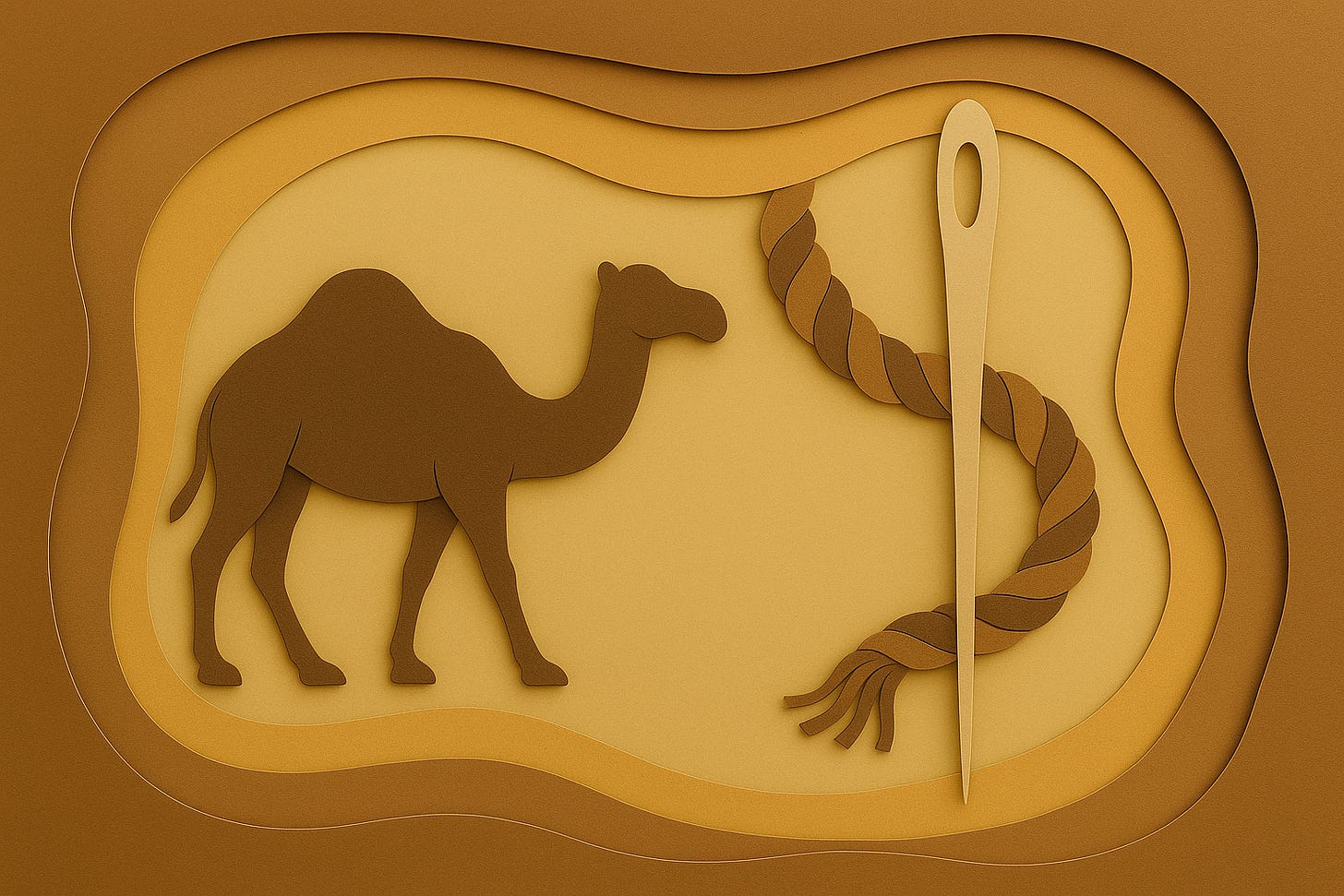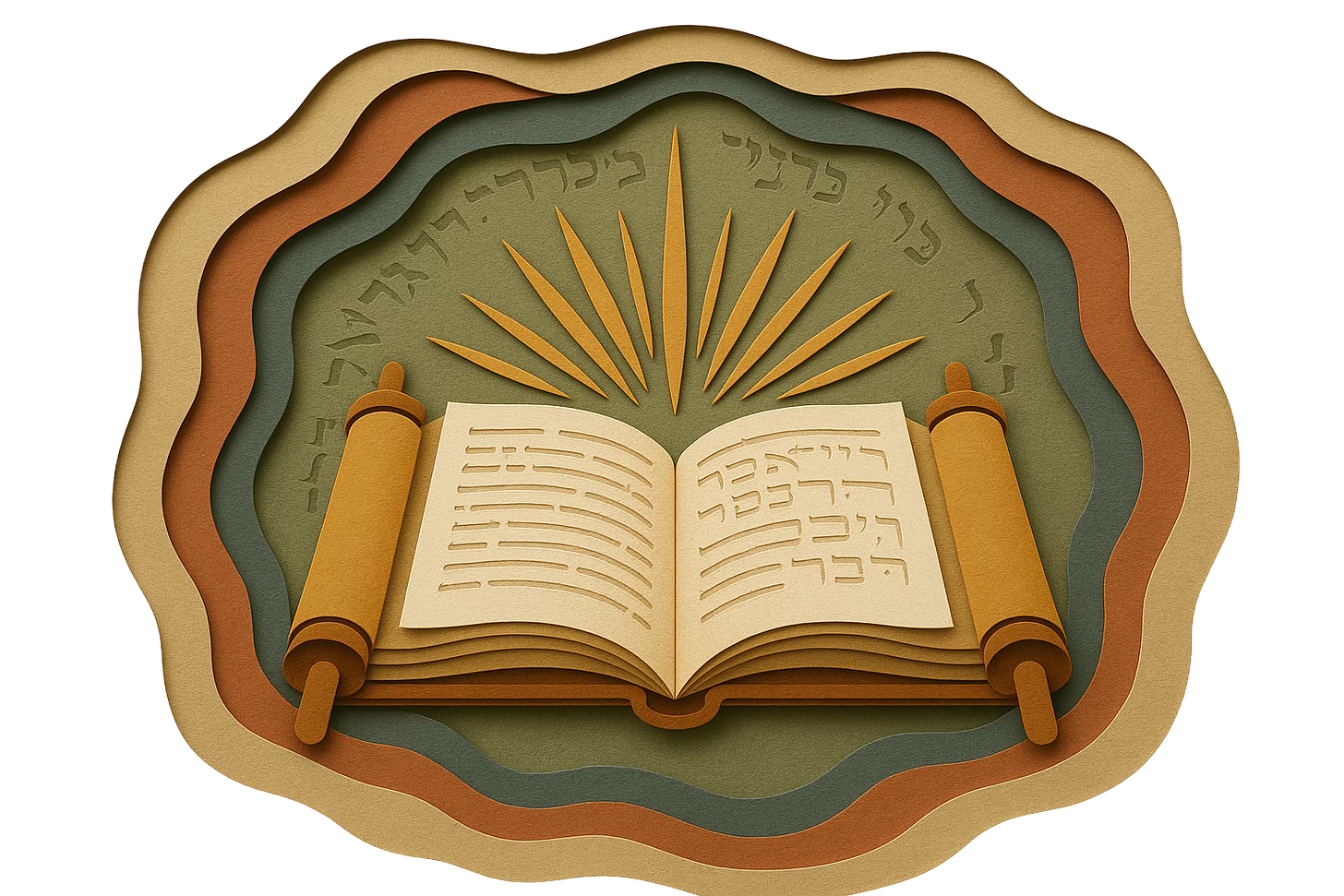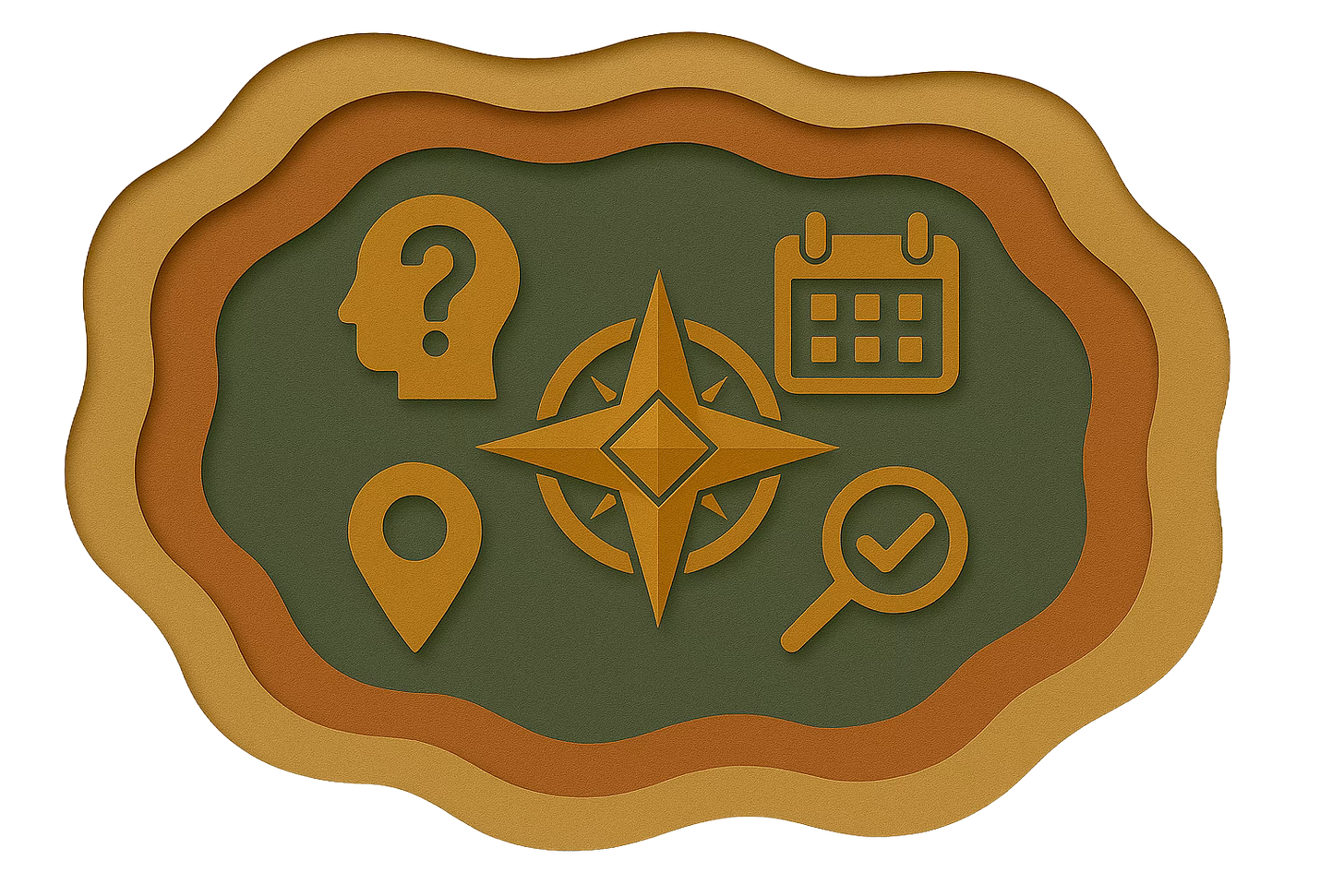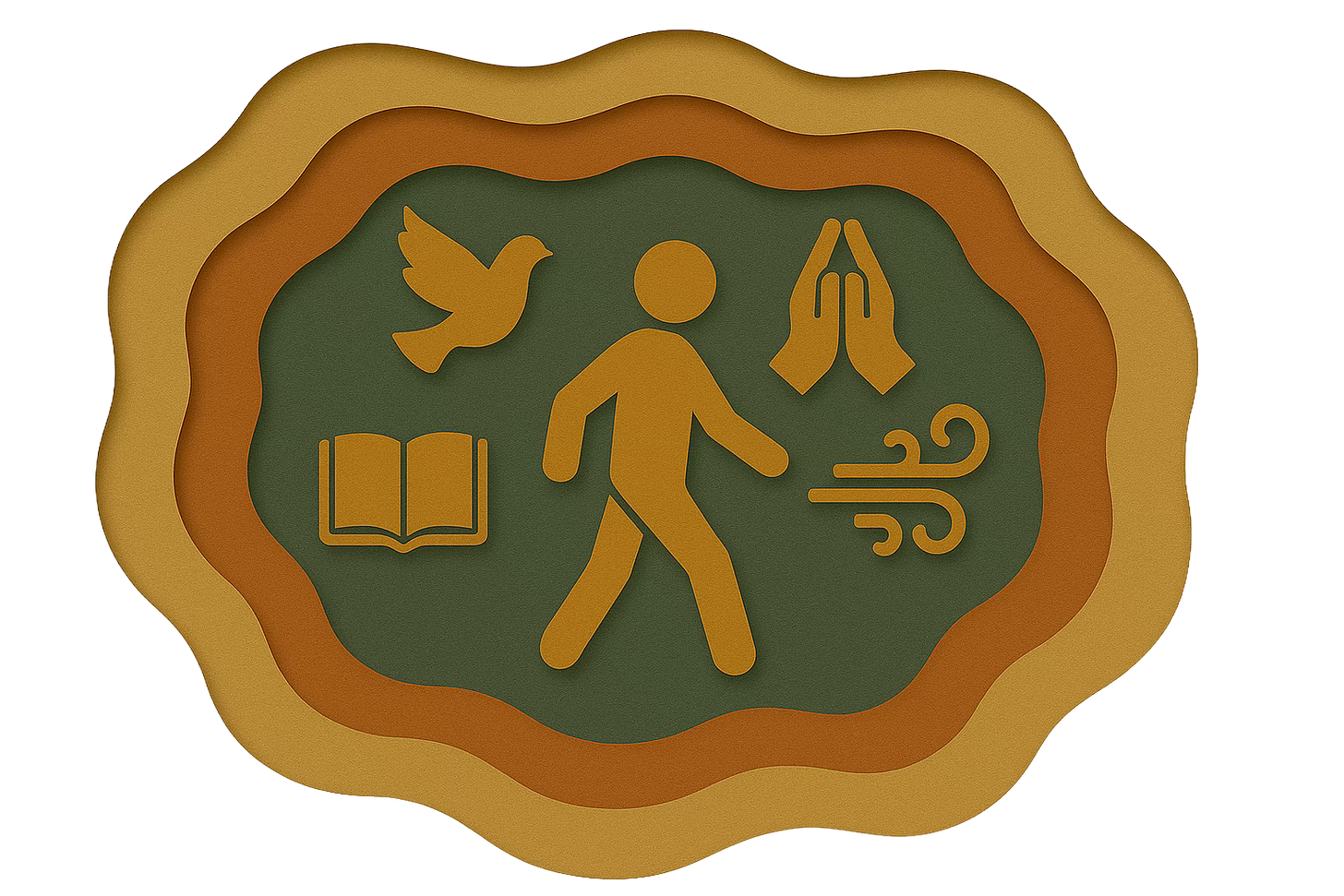Unraveled at the Needle’s Eye: The Rich Young Ruler and the Cost of Surrender
Wealth, Discipleship, and What Is Impossible Without God
Scripture: The Living Word
Key verse:
“Again I say to you, it is easier for a camel to go through the eye of a needle than for a rich man to enter the kingdom of God.” (Matthew 19:24)
Yeshua is on the road to Jerusalem, where the climactic events of His mission will soon unfold. Along the way, crowds press in, hungry for healing, teaching, or a word of hope. Into this swirl of voices and footsteps comes a young man of stature—wealthy, respected, and dressed in fine robes. To everyone’s surprise, he runs forward and kneels before the rabbi from Galilee.
His question is bold, echoing the longing of Israel through the centuries:
“Good Teacher, what must I do to inherit eternal life?” (Mark 10:17)
It is a question that seems humble, but Yeshua’s response will peel back layers of pride, performance, and misplaced security. The exchange ends not in triumph but in sorrow, as the young man walks away. And it leaves Yeshua’s disciples wrestling with one of the most impossible images ever spoken: a camel—or perhaps a thick rope—trying to pass through the eye of a needle.
Context: Behind the Words
Historical and Cultural Context
This encounter comes late in Yeshua’s ministry, on His final journey to Jerusalem. Passover is near, tension with the leaders is rising, and each step now presses toward the cross. His words sharpen with urgency: the closer He comes, the cost of discipleship grows clearer.
The rich ruler meets Him just before Jericho, only days from the crucifixion. Here Yeshua is not teaching theory but demanding decisive surrender on the threshold of His own.
By now He has already warned that no one can serve both God and mammon (Matthew 6:24), told parables of hidden treasure (Matthew 13:44), barns of grain (Luke 12:16–21), and forgiven debts (Matthew 18:23–35), and urged His followers to store up riches in heaven (Matthew 6:19–21).
He speaks of money more than almost any subject, because in Judea wealth meant power, honor, religious proof, and political leverage. To many, riches signaled God’s favor. By confronting the ruler publicly on the road to Jerusalem, Yeshua overturns that belief: money is no measure of covenant faithfulness, and discipleship cannot be bought or displayed—it must be surrendered.
The Exchange
The ruler’s approach looks impressive. He kneels before Yeshua—a sign of respect few wealthy leaders would offer a rabbi. But his words are telling:
“Good Teacher, what must I do to inherit eternal life?” (Mark 10:17)
In Jewish thought, no rabbi was casually called “good.” True goodness belonged only to God. His greeting may be less humility than flattery, an attempt to secure favor before witnesses. Yeshua seizes on this:
“Why do you call Me good? No one is good except One—that is God.” (Mark 10:18)
The ruler wants affirmation, but Yeshua gives examination. He lists commandments about loving others:
“Do not murder”
“Do not commit adultery”
“Do not steal”
“Do not bear false witness”
“Honor your father and mother”
(Luke 18:20)
The man responds confidently:
“All these I have kept since my youth.” (Mark 10:20)
This is the moment he likely expected applause. He has wealth, reputation, and a record of obedience. In front of the crowd, it looks like he’s about to be vindicated.
Instead, Yeshua looks at him with love—and then pierces the heart of the matter:
“One thing you lack. Go, sell all you have, give to the poor, and you will have treasure in heaven. Then come, follow Me.” (Mark 10:21)
The man’s confidence collapses. His face falls, and he walks away sorrowful, bound by the very possessions that seemed to prove his blessing (Matthew 19:22).
A Tale of Two Seekers
The young ruler’s sorrowful departure lingers in the minds of the disciples. He came publicly, knelt reverently, and asked about eternal life—but his heart was not ready to surrender. The Gospels give us another story to hold beside his, a mirror image of sorts: Nicodemus, a Pharisee and ruler of the Jews, who also approached Yeshua with questions. Their stories unfold differently in setting, posture, and outcome—and together they reveal what true discipleship looks like.
Nicodemus vs. The Rich Young Ruler
Nicodemus (John 3):
When: Comes at night, under the cover of darkness (John 3:2).
How: Alone, seeking clarity without an audience.
Why: His approach suggests risk and vulnerability — he is cautious, but genuinely curious.
Posture: Though a Pharisee, he admits Yeshua must be from God because of His works: “Rabbi, we know that You are a teacher come from God, for no one can perform these signs unless God is with him” (John 3:2).
Outcome: He struggles to understand (“How can a man be born when he is old?” — John 3:4), but he stays engaged. His humility grows over time: later he defends Yeshua before the council (John 7:50–51), and finally he helps bury Him, bringing costly spices to honor Him (John 19:39).
Rich Young Ruler (Synoptics):
When: Comes in broad daylight, on the road, in public (Mark 10:17).
How: Kneels before Yeshua in front of a crowd.
Why: At first glance, it looks like humility. But in the cultural setting, it may be veiled and calculated — an attempt to be seen as righteous and affirmed by Yeshua in front of others.
Posture: Leads with flattery (“Good Teacher” — Mark 10:17). Asks a question he seems to expect will highlight his piety.
Outcome: When confronted with the cost of true discipleship, he walks away sorrowful (Matthew 19:22). The appearance of humility masks a heart unwilling to surrender.
Was it Self-Exaltation?
It’s possible. By staging this conversation publicly:
He could be seeking rabbinic validation before witnesses — if Yeshua had said, “Yes, you have kept the commandments, eternal life is yours,” his reputation would have been sealed.
His kneeling posture in public may have been a veiled and calculated performance of humility. Instead of leaving with applause, he leaves in shame, exposed by Yeshua’s call to give up what truly ruled him.
Lesson for Discipleship
Nicodemus risks reputation to ask questions in secret. The ruler risks nothing — and likely seeks to be honored in public.
True discipleship is not about when or where you approach Yeshua — it’s about how. Nicodemus comes to learn; the ruler comes to be confirmed.
Yeshua receives both — but only the one willing to stay, wrestle, and surrender walks away changed.
Aramaic Nuance: Camel or Rope?
After the rich young ruler walks away, Yeshua turns to His disciples and delivers one of His most striking images:
“It is easier for a camel to go through the eye of a needle than for a rich man to enter the kingdom of God.”
(Matthew 19:24; Mark 10:25; Luke 18:25)
In Greek, the word is kamelos (κάμηλος), which clearly means camel—a massive animal of burden, comically out of proportion with a tiny sewing needle. The image is absurd, even humorous, underscoring the impossibility of entering the Kingdom on one’s own terms.
But in the Aramaic Yeshua likely spoke, the word gamla (ܓܰܡܠܳܐ / גמלא) could mean both camel and rope. This opens a layered nuance:
Camel reading: an exaggerated impossibility — as unthinkable as cramming a beast through the hole of a needle.
Rope reading: a futility image — a thick rope cannot pass through a needle’s eye unless it is unraveled strand by strand.
Some scholars suggest the “rope” reading of gamla may reflect a first-century association with camel-hair ropes—thick, durable cords used for tents, shipping, or loads. If so, the word could have evoked both the animal and the rope spun from its hair, each a heavy, unwieldy image of burden. While we cannot be certain Yeshua intended this double image, the linguistic overlap in Aramaic and the practical use of camel hair make it plausible His hearers pictured both: the largest beast and the thickest rope, each absurdly unfit for a needle’s eye.
Here the rope nuance deepens the image: a rope cannot pass through the needle’s eye whole. It must be unwound, strand by strand, and re-threaded to fit. Likewise, a life bound by pride, possessions, and self-reliance must be unraveled before God can weave it into the narrow way of His Kingdom. What is impossible whole becomes possible in surrender.
Covenant: The Relational Core
The image of a camel—or a rope—trying to squeeze through a needle’s eye leaves the disciples stunned. If wealth, long assumed to be Yahweh’s blessing, could actually keep someone out of the Kingdom, then what hope was left?
“The disciples were utterly astonished, saying to one another, ‘Then who can be saved?’”
(Mark 10:26)
Their astonishment is more than surprise. It is a collapse of categories. If the rich—the very people seen as models of covenant favor—cannot enter easily, then surely no one can.
Yeshua meets their fear head-on:
“With men it is impossible, but with God all things are possible.”
(Matthew 19:26)
This is the covenant heart of the story. Entrance into the Kingdom is not secured by wealth, status, or even meticulous commandment-keeping. It cannot be purchased or performed. It is impossible on human terms. But with God, the impossible becomes possible. Just as a rope unraveled strand by strand could pass through the needle’s eye, so too a life surrendered to God’s unraveling can be rewoven into His Kingdom.
Peter, still grappling with what discipleship demands, speaks for the group:
“Look, we have left everything we had to follow You. What then will there be for us?”
(Matthew 19:27)
Rather than rebuke him, Yeshua affirms the cost and promises the reward:
“Amen, I tell you: In the renewal of the world, when the Son of Man sits on His glorious throne, you who have followed Me will also sit on twelve thrones, judging the twelve tribes of Israel. And everyone who has left houses, brothers, sisters, father, mother, children, or property for My name’s sake will receive a hundred times as much, and will inherit eternal life.”
(Matthew 19:28–29)
The disciples learn that the Kingdom is not about holding on, but letting go. What is surrendered in this age will be restored a hundredfold in the age to come. The ruler clung and lost; the disciples released and would gain beyond imagining.
Practice: Living It Out
The story of the rich young ruler reminds us that discipleship is not about adding one more rule or achievement to our lives, but about surrendering the very things we cling to most. The Aramaic nuance of gamla helps us see this clearly: like a thick rope, our lives are bound with many strands—ambition, possessions, pride, comfort, relationships, fears. As long as they stay tightly wound, we cannot pass through the narrow way of the Kingdom. Only when God begins to unravel us strand by strand can He re-thread our lives into something fit for His purposes.
Three Takeaways
Eternal life cannot be earned — it is received through surrender to God’s power.
Wealth and status can bless or bind — when clung to, they become chains rather than gifts.
What is impossible for man is possible with God — He alone can unravel and reweave a life.
Discussion Questions
The rich young ruler came to Yeshua with a question that seemed humble but may have been veiled and calculated. How can we discern the difference between approaching God with genuine surrender versus seeking His affirmation of what we already want to hear?
If the Aramaic nuance points to a rope that must be unraveled to pass through the needle’s eye, what “strands” of your own life might God be asking to unravel so He can re-thread them into His Kingdom purposes?
The disciples were astonished because wealth and status were seen as signs of blessing. What assumptions in our culture today might Yeshua overturn in the same way—and how does that challenge the way we view success, security, and discipleship?
Seven-Day Practice Rhythm
Day 1 (🪞 Personal): Journal one area of your life where you feel “tightly wound” — an attachment, ambition, or possession you struggle to release. Ask God to begin loosening that strand.
Day 2 (🤝 Community): Share a meal, gift, or act of service with someone who cannot repay you. Practice generosity that unwinds pride.
Day 3 (🙏 Spiritual): Meditate on Matthew 6:19–21 — “Where your treasure is, there your heart will be also.” Pray for God to shift your treasure toward His Kingdom.
Day 4 (🪞 Personal): Fast from one comfort (media, shopping, entertainment, or food for a set time). Let the hunger or absence remind you of the rope being unraveled.
Day 5 (🤝 Community): Give anonymously to meet a real need. Allow secrecy in generosity to pull apart the strands of pride.
Day 6 (🙏 Spiritual): Pray Psalm 73:25–26 — “Whom have I in heaven but You?” Surrender any strand that still resists His unraveling.
Day 7 (Sabbath Rest): Rest in God’s sufficiency. Reflect on how He provides when you let go, and give thanks that with Him the impossible becomes possible.
Closing Blessing
May the God who unravels every tightly bound strand of our lives also weave you into the fabric of His Kingdom.
May you find the courage to release what you cling to, the faith to trust Him with what you surrender, and the joy of discovering that what is impossible for man is possible with God.
Walk through the narrow way not in your own strength, but with hands open, rope unraveled, heart rewoven— a disciple held together by the love of Messiah.






